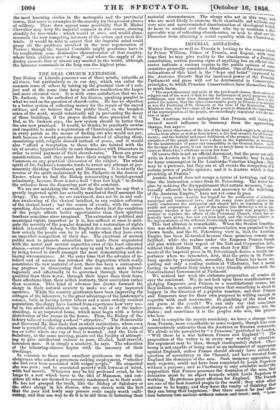THE REAL CHURCH EXTENSION.
THE Bishop of Lincoln possesses one of those minds, 'valuable at all times, but particularly so in our day, which can enlist the common sense of others by taking up the practical view of a sub- ject and at the same time keep in active recollection the larger and more elevated view. It is with some satisfaction that we see Dr. Jackson, in the cathedral of his diocese, speaking parallel to what we said on the question of church-rates. He has no objection to a better system of collecting money for the repair of the sacred edifices, and we believe that the public itself, in the broadest sense of the word, would voluntarily aid in preventing the decay of those buildings, if the proper method were presented to it. But, as Dr. Jackson says, the new system should be better than the one now practised. It would, he thinks, be peculiarly unwise and impolitic to make a registration of Churchmen and Dissenters in every parish as the means of finding out who would not pay, both because it would provoke passions instead of allaying them, associating with religion discord instead of peace, and it would also "afford a temptation to those who are tainted with the sin of avarice hypocritically to rank themselves with Dissenters in order to avoid payment of their church-rates." These are grave considerations, and they must have their weight in the House of Commons on any practical discussion of the subject. The whole spirit of Dr. Jackson's remarks tends to arrest any attempt at per- manently, dividing Churchmen and Dissenters. It is exactly the reverse of the spirit maintained by Dr. Philpotts in the diocess of Exeter, where we find the Bishop consecrating a burial-ground reluctantly, because there is not a wall "four feet high" to divide the orthodox from the dissenting part of the cemetery. We are not mistaking the wish for the fact when we say that a greatly improved spirit has actually manifested itself amongst the clergy. The novelty, we are convinced, does not lie in any sud- den awakening of the clerical intellect, in any sudden softening of the clerical heart ; but the course of events, with the corre- sponding disclosures of experience, has shown that the condition of the people affords better opportunities than their spiritual teachers sometime since imagined. The extension of political and municipal rights, imperfect as it is, has sufficed at once to miti- gate the severity of the popular demand for a restoration of rights which inherently belong to the English freemen, and has shown how orderly the people can be in all ranks when they have even an imperfect recognition of their due. The exertions of several public men to promote education have made them acquainted with the moral and mental capacities even of the least educated elasses,—even of those classes who may be said to be anti-educated by being forced to dwell amongst the most demoralizing and de- basing circumstances. At the same time that the advance of in- tellect and of science has rebuked the dogmatism which really constitutes the raw material of sect, there has been a correspond- ing progress in discovering that men are much more advan- tageously and effectually to be governed through their better qualities than their worse, through their hopes than their fears, their affections than their selfish instincts, their conviction rather than coercion. This kind of advance has drawn forward the clergy in their natural anxiety to make use of any improved agencies. While the country gentlemen have been improving the cottages of the labourers, to the great advantage of the landowner's estates, both in having better labour and a more orderly resident population, the clergy have learned from experience how very use- ful in the adult education of the soul, as well as of the under- standing, is an improved home, which must begin with a better distribution of the rooms in the house. Thus, the Bishop of Sa- lisbury talks of rendering a school " attractive." The Honourable and Reverend Mr. Best finds that in adult institutions, where even beer is permitted, the attendants spontaneously ask for six cups of 'tea or coffee where one cup of beer is wanted. And the Dean of falisbury, at the same meeting, points out the futility of attempt- ing to give intellectual culture to poor, ill-clad, half-starved, homeless men. It is simply a mockery, he says. The education of the labouring-classes begins with the masonry of their dwellings. - In contrast to these most excellent gentlemen we find that clergyman who asked a governess seeking employment, "whether she had ever been associated with vulgar people." He suspected she was poor ; and he associated poverty with lowness of mind, 'with bad morals. Whatever may be his professed creed, he be- longs to a sect which bows to the idol of Mammon, and con- seders all who are doomed to poverty condemned as to their souls. He has not grasped the truth, like the Bishop of Salisbury or the other clergy in his diocess, who are struck with the fact that the poor and lowly may possess souls amply worth culti-
vating, and that one way to do it is to aid them in • g their
material circumstances. The clergy who act in this way, and who are most likely to exercise their charitable aid without any very nice and narrowminded discrimination of theological belief, do more to combat sect than those who try to maintain a die.: agreeable way of collecting church-rates, or seek to shut out the Dissenter from attaining a social equality with the Churchman.


























 Previous page
Previous page